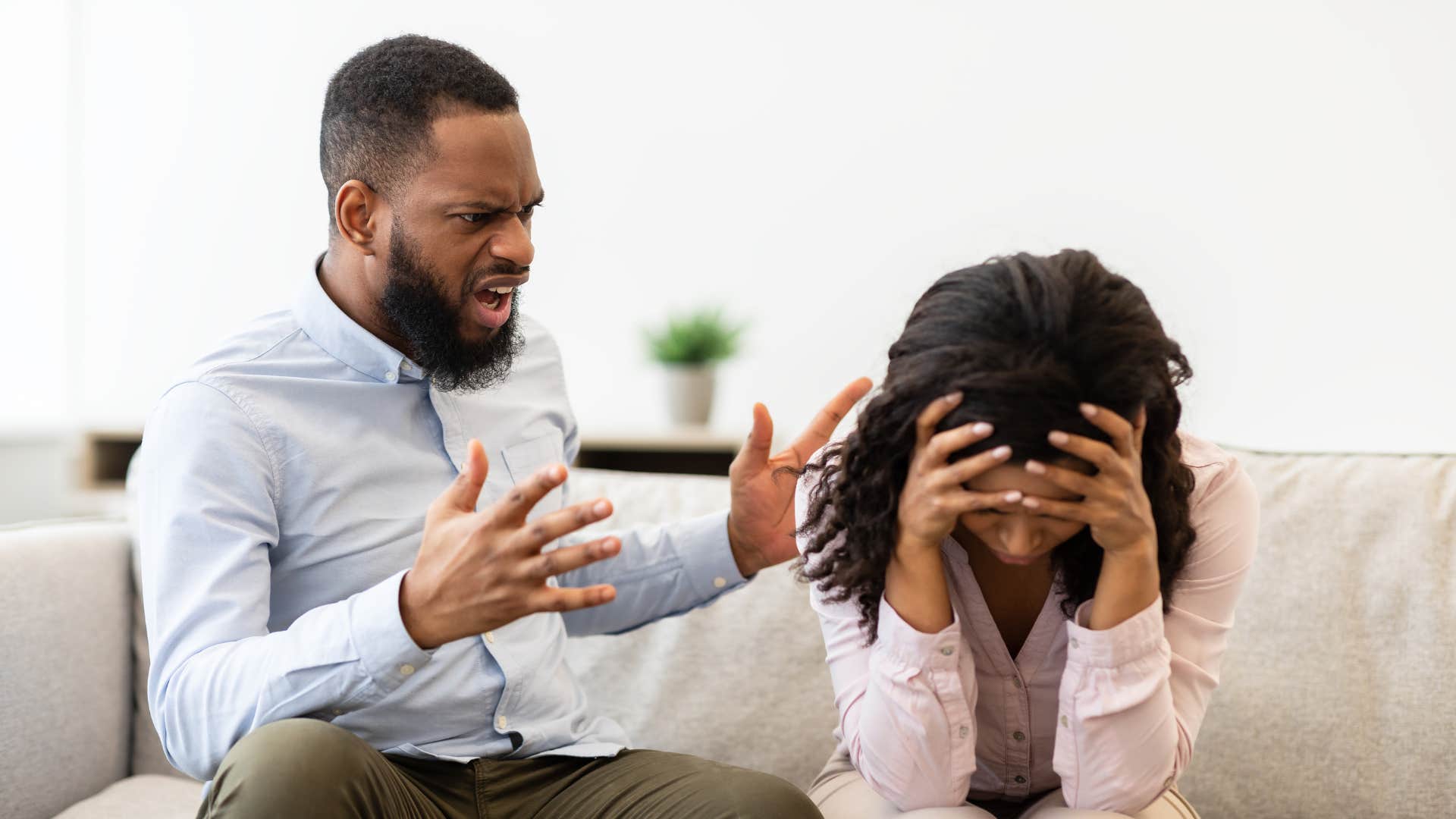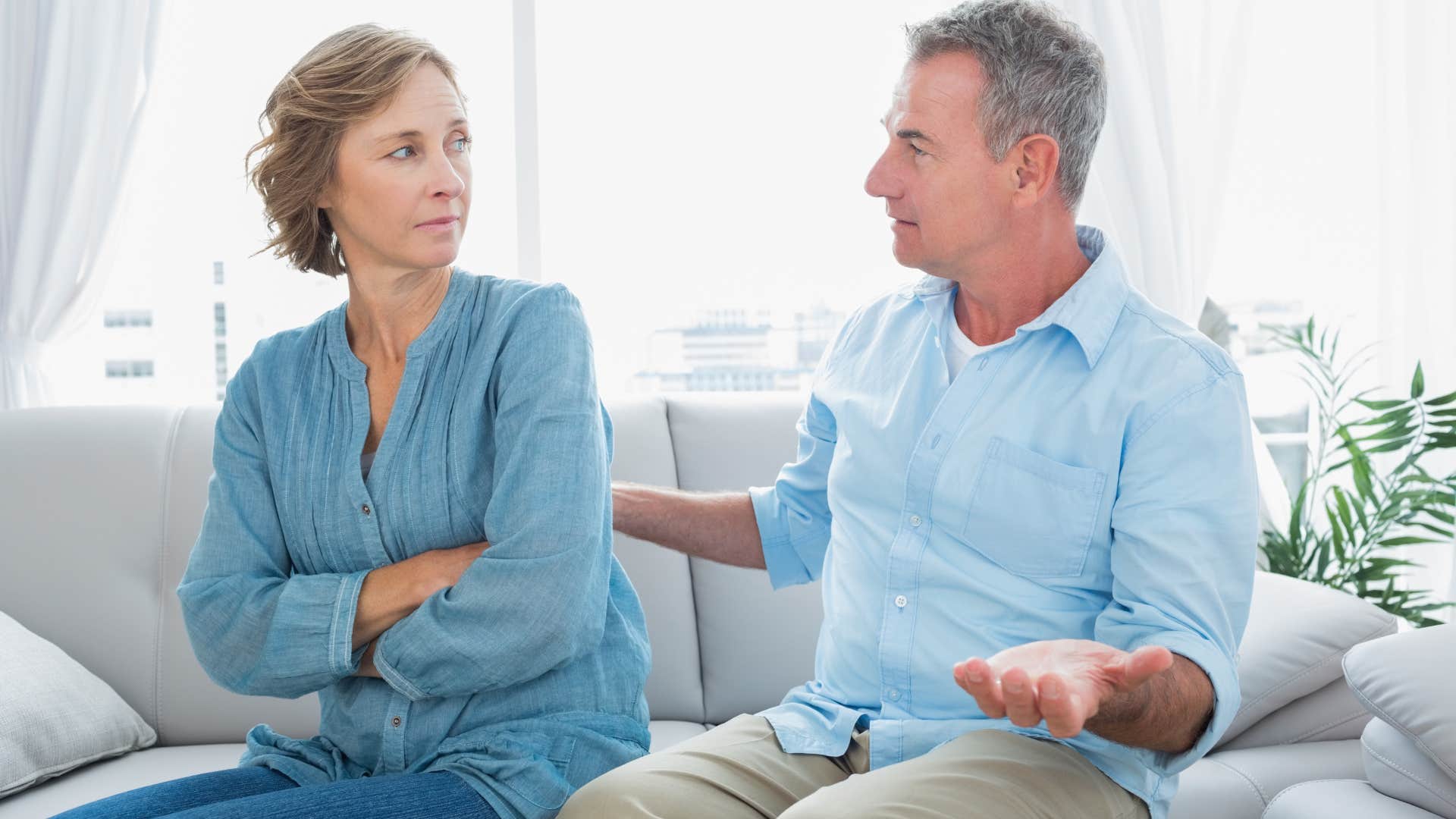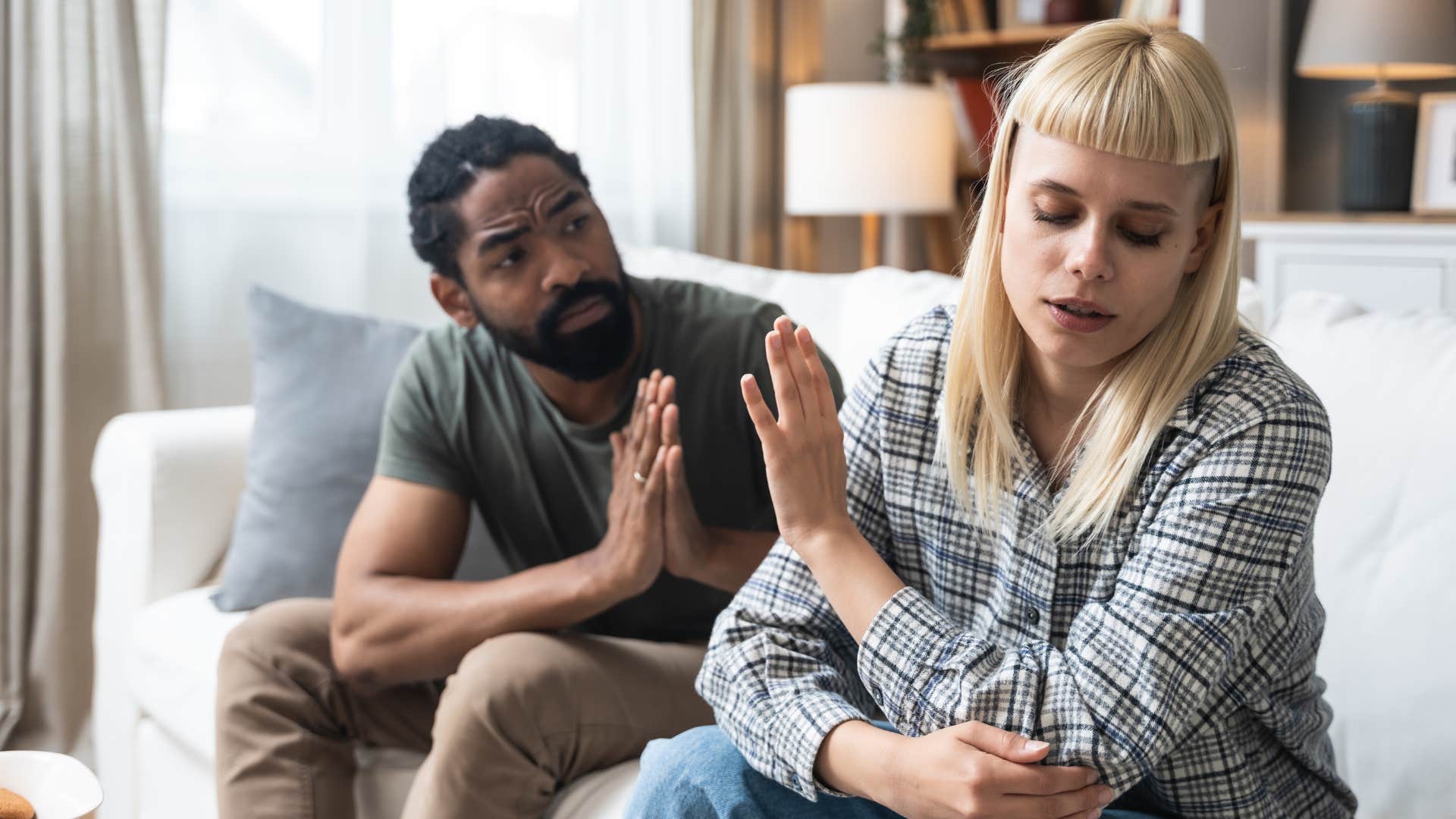10 Subtle Signs You're Being Guilt-Tripped In Your Relationship
It's a toxic manipulation tactic that leads to low self-worth.
 Tirachard Kumtanom | Shutterstock
Tirachard Kumtanom | Shutterstock Guilt-tripping is a manipulative tactic used to make someone who cares about you feel bad. Unfortunately, in relationships, this can lead to walking on eggshells around your partner and feeling belittled on a constant basis. Eventually, guilt-tripping can backfire and the roles may switch, where the other partner now uses this tactic.
While these actions aren't quite obvious, there are certain subtle signs you're being guilt-tripped in your relationship. When you notice that this behavior affects your emotional, physical, and mental health, it's time to speak up for yourself. Because unless you set boundaries and sustain them over time, your relationship will stay in this negative space.
Here are 11 subtle signs you're being guilt-tripped in your relationship
1. They always make you feel bad
 MDV Edwards | Shutterstock
MDV Edwards | Shutterstock
Does your partner suggest that you don't work as hard as them, their parents, or other people they know at home, work, or both? When your partner is putting you down and making you feel bad for things that aren't even within your control, it's one of the damaging but subtle signs you're being guilt-tripped in your relationship.
"Tolerating a hurtful partner can be challenging and can have negative impacts on one's emotional and physical well-being. However, people may choose to tolerate a hurtful partner for various reasons," psychologist Jeffrey Bernstein explained, which can include low self-esteem, or fear.
2. They bring up the past any chance they get
 Prostock-studio | Shutterstock
Prostock-studio | Shutterstock
If your partner keeps bringing up the past to control you, that's a form of guilt-tripping. And it's not a good feeling, especially when you've moved past a certain mistake or action.
As therapist Alysha Jeney revealed, when partners bring up past issues in a defensive way, they're feeling insecure about the relationship. Perhaps they aren't getting something they want, which a report from Eastern Illinois University pointed out.
3. They convince you they're the best
 simona pilolla 2 | Shutterstock
simona pilolla 2 | Shutterstock
Of course, guilt-tripping is intended to make you feel guilty, but when your partner does it, it's specifically to make sure you never forget how great they are. When they keep reminding you of favors they did for you, even if it was just one favor one time, they keep mentioning it so they can manipulate you into doing whatever they want.
According to counselor Jamie Cannon, "Manipulators are experts at understanding, and using, others' emotions to get what they want... In many ways, it is more insidious, long-lasting, and duplicitous than other forms of manipulation. It causes self-doubt and will drive you to question your own sense of reality."
4. They use your feelings against you
 AYO Production | Shutterstock
AYO Production | Shutterstock
Some partners have mastered faking emotions, whether anger or sorrow, but won't directly tell you what they need from you. Instead, they use guilt-tripping as a tactic to get their way, even when it negatively affects you in the process.
You start running around trying to figure out what their pain is and do things to appease them. But these are expert manipulators, and their response is a stale "nothing" or silence to trick you into moving mountains to please them.
5. They use conflict avoidance
 fizkes | Shutterstock
fizkes | Shutterstock
The silent treatment could last for a very long time to guilt-trip you so they gain eternal favors. Guilt is a strong emotion in the human psyche and the silent treatment is an art, so it could be argued that it's the topmost form of emotional guilt-tripping.
By using conflict avoidance, you're stuck in suspended animation as you have nothing to go with except what you are feeling within — mostly confusion and guilt. As a study published in the journal Emotion explained, guilt like this can lead to self-punishment.
6. They assume the role of a disapproving parent
 Dikushin Dmitry | Shutterstock
Dikushin Dmitry | Shutterstock
Often, a partner assumes the role of a disapproving parent and guilt-trips their partner through cold shoulders, sideways looks, and even using "that" tone of voice. But it's important to remember that your partner is supposed to be your equal, not your parent.
"The line between being a supportive partner and acting as a caretaker can sometimes blur... This imbalance can create tension, diminish intimacy, and leave one person feeling overly responsible while the other becomes increasingly dependent. While caring for your significant other is natural and often necessary, consistently acting as a caretaker can create an unbalanced dynamic that leaves both individuals dissatisfied," psychologist Mark Travers said.
7. They say you 'owe' them
 GaudiLab | Shutterstock
GaudiLab | Shutterstock
One of the most subtle signs you're being guilt-tripped in your relationship is when your partner says they "owe" you. Whether it was because they did a favor for you or just feel entitled as your partner, it's incredibly transactional of them. This form of direct guilt-tripping happens rarely, but it still can be extremely harmful to the relationship.
Philosophy professor Mark D. White explained, "In a relationship, such obligations aren't felt as obliging us; we don't think in terms of 'owing' anything to our partners, or of our partners 'expecting' anything from us. We just fulfill such obligations because they're part and parcel of the relationship itself (or, in other words, they're constitutive of the relationship)."
8. They engage in passive-aggressive behavior
 wavebreakmedia | Shutterstock
wavebreakmedia | Shutterstock
When your partner doesn't want to directly ask for something because they are not "that" person, but will tell you how someone else does something for their partner without asking for it, that's passive-aggressive guilt-tripping. Unfortunately, this type of behavior isn't something that can change overnight.
"It becomes much easier for passive-aggressive people to say what they don't want, rather than what they do want. It's like running life's race with your shoelaces tied. But the frustration of living a life of pinched desires leaks out in being 'obstructionistic' — to their spouse, therapist, boss, and anyone else that might have a say, or at least a suggestion, about what they should do," relationship experts Dr. Ellyn Bader and Dr. Peter Pearson explained.
9. They thrive on 'tough love'
 NDAB Creativity | Shutterstock
NDAB Creativity | Shutterstock
While "tough love" may be a way for partners to set boundaries in a compassionate way, someone who is guilt-tripping you uses this as a way to control and manipulate. Maybe they belittle your efforts so you do more for them, or call you names under the guise that they're trying to improve you.
If you ever question them, they say, "I care about you," "I know you can do better," or "It's for your good." But the truth is, they don't actually care — they're just trying to guilt-trip you.
10. They constantly gaslight you
 Srdjan Randjelovic | Shutterstock
Srdjan Randjelovic | Shutterstock
Because it's not as noticeable, gaslighting is one of the subtle signs you're being guilt-tripped in your relationship. Master manipulators use this tactic frequently, and cruelty is the point. They do something and deny it so convincingly, you start wondering if you are going insane.
As counselor Brittney Lindstrom brilliantly put it, "Gaslighting is a form of emotional and mental abuse in which the abuser questions or denies the victim's reality, making them doubt themselves to deflect from their own guilt and bad behavior. Ultimately, this often grants the abuser what they want — control over the victim's thoughts, feelings, and actions."
Keya Murthy, M.S. is a clinical hypnotherapist, spiritual life coach, energy medicine practitioner, and #1 international bestselling author.

